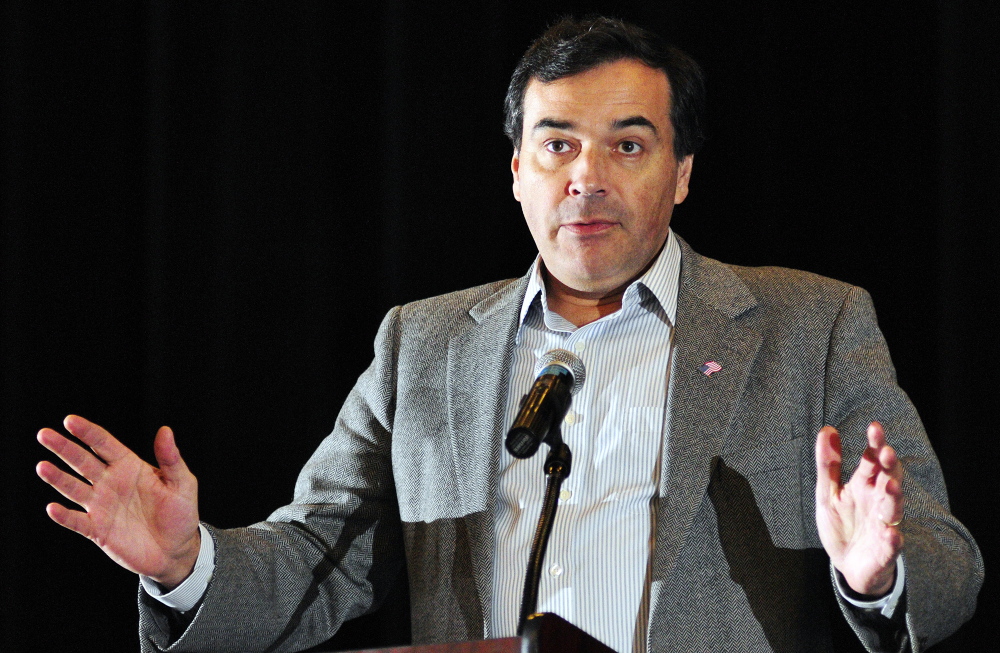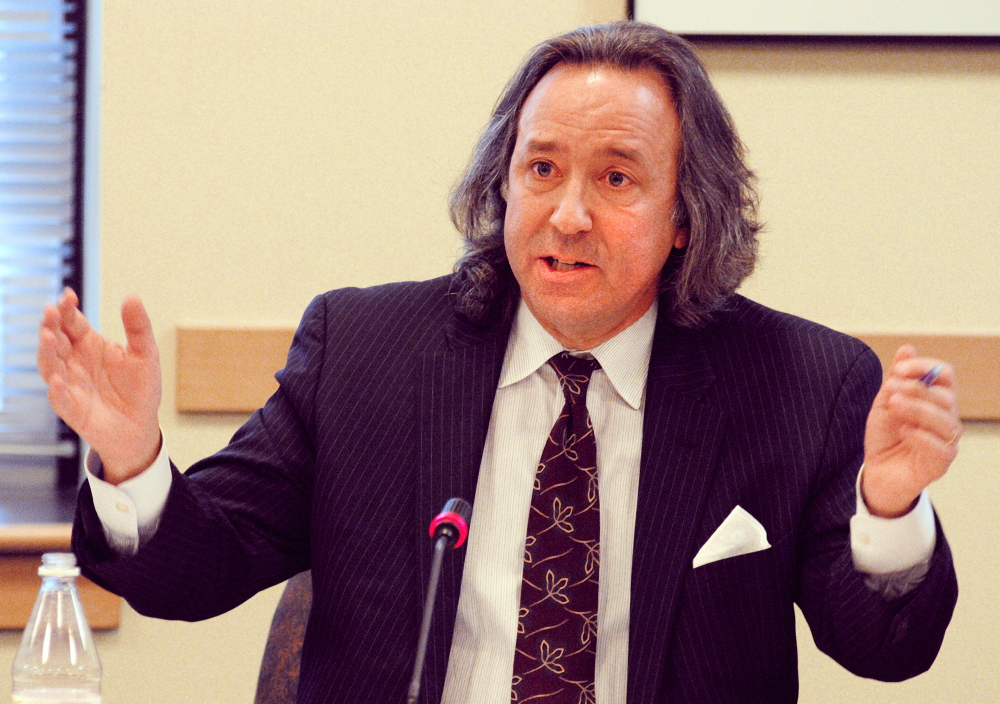AUGUSTA — Maine Republican Party leaders announced Wednesday that they will lead a statewide petition drive for a single referendum question on overhauling the state’s welfare system and reducing the state income tax.
The first part of the proposed referendum would ask voters if they want to reduce the state’s top income tax rate to 4 percent gradually over a four-year period. Maine’s top rate is now 7.15 percent.
The second part calls for a series of changes to welfare policy – many of which have been sought by some Republicans, including Gov. Paul LePage – but have failed to get enough support in the Legislature.
Those changes include requiring drug testing for recipients of Temporary Assistance for Needy Families; instituting stronger work requirements; banning the use of food stamp funds to buy liquor, tobacco and other items; and making asylum seekers ineligible for benefits.
The proposal closely mirrors LePage’s key policy objectives. Several members of his administration, including staff in his office and the Department of Health and Human Services, drafted the proposed language and provided it to the Republican Party.
Party Chairman Rick Bennett, a former state Senate president, said party officials will begin gathering about 62,000 signatures this fall with a goal of putting a question on the November 2016 ballot.
Bennett said at a news conference outside the State House that the tax and welfare measures are common sense.
“As we know, our welfare system is bloated, it’s dysfunctional, it’s broken,” he said. “It needs reform. But Republican efforts in the last legislative session to pass meaningful reform were frustrated by (Democrats).”
Bennett also blamed Democrats for rejecting income tax cuts beyond the incremental reductions approved by the Legislature in 2001 and 2015.
“These are very popular reforms,” he said. “I expect people will vote for them overwhelmingly.”
But Maine Democratic Party Chairman Phil Bartlett called the initiative a “political stunt designed to distract from Republicans’ failed economic policies.”
State Republican Party leaders met last weekend to iron out the details, some of which emerged this week.
The proposal would reduce the income tax rate by about 0.8 percentage points each year from 2018 to 2021, bottoming out at 4 percent. There also is language to allow for future revenue streams, such as from liquor sales, to bring the rate down even more, potentially to zero.
One of the drive’s biggest cheerleaders is likely to be LePage, who has been campaigning relentlessly for tax cuts and welfare changes.
At a town hall forum Tuesday in Farmington, the governor – frustrated with his inability to work with the Legislature – said he would hold an event to promote the campaign every week between now and the November 2016 elections.
OBJECTIONS FROM DEMOCRATS, OTHERS
Democrats and others were critical of the referendum proposal.
Rep. Drew Gattine, D-Westbrook, House chair of the Health and Human Services Committee, objected to the welfare changes.
“Not a single item on this laundry list does anything to make people job-ready and move them into sustainable employment,” Gattine said in a written statement. “What it does do is add a layer of bureaucracy to state government that won’t save taxpayers money or hold the LePage administration accountable for its failure to move Maine’s economy forward.”
A representative of the immigrant community said the proposal will put Maine “on the wrong side of history.”
Alain Nahimana, coordinator of the Maine Immigrants’ Rights Coalition, said lawmakers did the right thing this year by passing a law to allow asylum seekers to apply for and receive assistance.
“They recognized that providing temporary help to immigrants is both a good investment for Maine and the right thing to do,” he said. “Any effort to take away this lifeline will put Maine on the wrong side of history.”
The Maine Council of Churches also expressed concern over the message the referendum would send to those less fortunate.
“The answer to these issues is public discourse and constructive policies, in our Maine tradition, and not a willingness to scapegoat the very people who need our support,” said Suzanne Lafreniere, director of public policy for the Roman Catholic Diocese of Portland and chair of the council’s public policy committee.
Bartlett, the Democratic Party chairman, said he found it ironic that on the same day Pope Francis was making a plea in the United States for compassion, Maine Republicans want to take away a basic safety net.
DUAL ISSUES IN REFERENDUM DEFENDED
State Sen. Eric Brakey, R-Auburn, joined Republican Party chairman Bennett at Wednesday’s announcement and said voters were clear in their desire for welfare reform.
“If the Legislature is not going to act, let’s give the Maine people an opportunity,” he said.
Republicans and LePage already have made significant changes to public assistance programs, including capping Temporary Assistance for Needy Families benefits at 60 months; instituting a photo ID requirement for some recipients; and, most recently, proposing an “asset test” that would make food stamp recipients ineligible for benefits if they have more than $5,000 in the bank or own a snowmobile, boat, ATV, camper or certain other assets worth more than that amount.
Although the language for the Republican referendum question will not be finalized until signatures are gathered, the party may not be able to roll all of its proposals into a single ballot measure.
According to the state law that outlines the process for a citizens initiative, petitioners are advised by the Secretary of State’s Office to create a “separate question for each issue.”
That’s because voters may have different opinions on different issues and won’t necessarily support, for example, all of the proposed welfare changes as well as the income tax cuts.
Bennett acknowledged the risk in rolling several ideas into one question, but said the proposal was well thought out.
Not all Republicans are on board, however.
Lance Dutson, a longtime Republican strategist who has worked for U.S. Sen. Susan Collins, said the citizen initiative will take away resources that the party should be spending to help elect Republicans to state House and Senate seats.
Dutson, a LePage critic, said the initiative puts the party squarely in line with a governor who has become “increasingly erratic.”
“This end-around the legislative process is another clear indication of the governor, in his caustic way, forcing his will on the people,” Dutson said.
Bennett disagreed.
“There is a tremendous energy – and it goes beyond the Republican Party – to get meaningful policy done,” he said.
Send questions/comments to the editors.





Success. Please wait for the page to reload. If the page does not reload within 5 seconds, please refresh the page.
Enter your email and password to access comments.
Hi, to comment on stories you must . This profile is in addition to your subscription and website login.
Already have a commenting profile? .
Invalid username/password.
Please check your email to confirm and complete your registration.
Only subscribers are eligible to post comments. Please subscribe or login first for digital access. Here’s why.
Use the form below to reset your password. When you've submitted your account email, we will send an email with a reset code.